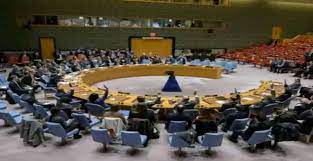UNITED NATIONS: At its fifth attempt, the UN Security Council has adopted a resolution calling for an extended humanitarian pause in the war in Gaza after the US under growing international dismay at the inaction over the tragedy in the territory withheld its veto while criticising it.
The resolution adopted on Wednesday also demanded the release of the hostages taken by Hamas when it attacked Israel on October 7 and called for a humanitarian corridor to ferry relief supplies to Gaza.
Russia and the UK joined the US in abstaining from voting on the resolution allowing it to be adopted with the support of the other 12 Council members, including France and China, the other permanent members.
Although the Security Council has enforcement powers and its resolutions are legally binding, this resolution will be merely symbolic as it does not include any penalties for ignoring it – which would be impossible to enforce anyway.
An amendment proposed by Russia to call for a “humanitarian truce leading to a cessation of hostilities” – in other words, a ceasefire – failed to pass because it did not get the minimum of nine votes, and the sole vote against it by the US did not translate into a veto.
The resolution proposed by Malta was a desperate attempt to get the Security Council to act on the worsening humanitarian situation in Gaza where Israeli troops had taken over a hospital after sustained bombing that, according to the Gaza health ministry, has killed more than 10,000 people.
It comes 46 days after the Hamas’ October 7 attack on Israel that killed about 1,200 people and took about 240 people as hostages, many of whom are still in captivity.
Israel began its continuing retaliation the next day through relentless bombing and started a ground invasion this week.
United Arab Emirates Permanent Representative Lana Zaki Nusseibeh said that the Security Council’s failure to act on Gaza till now had created the impression “outside this building, and in our region in particular, the Council appears indifferent to the carnage and dismissive of the suffering”.
Although she abstained on the resolution, US Permanent Representative Linda Thomas-Greenfield echoed a similar sentiment.
“I think many had given up hope that we would ever speak on this conflict. But that’s exactly what we just did,” she said.
Two of the resolutions did not get the required minimum of nine votes to pass because of the abstentions of many members, and one was vetoed by the US and another by China and Russia.
Pictures of suffering children and other civilians in Gaza wounded in the Israeli bombing gave rise to international demands for a pause if not a ceasefire that brought pressure on Washington, which had earlier vetoed an almost similar resolution, to allow the resolution to pass.
The resolution demands that “all parties comply with their obligations under international law, notably with regard to the protection of civilians, especially children”.
It called for the creation of a safe route for “full, rapid, safe and unhindered humanitarian access” to get relief supplies, including fuel, from the UN and aid organisations to the people of Gaza.
It said the humanitarian pause in fighting should be for enough days to get the relief through, for rescue efforts and to repair essential infrastructure.
The resolution does not condemn Hamas or mention Israel’s right to defend itself, which the US has cited as the reason for vetoing the earlier resolution.
Thomas-Greenfield said, “I am horrified that a few members of this Council still cannot bring themselves to condemn the barbaric terrorist attack that Hamas carried out against Israel on October 7.”
“What is stopping them from unequivocally condemning the actions of a terrorist organisation that is determined to kill Jews and that gunned down civilians, burned families alive, and executed children,” she asked.
“Ultimately, the United States could not vote yes on a text that did not condemn Hamas or reaffirm the right of all Member States to protect their citizens from terrorist attacks,” she said, adding that Washington, however, supports “many of the important provisions” in it.


